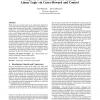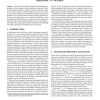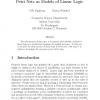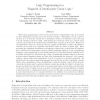129
Voted
ICFP
2010
ACM
15 years 2 months ago
2010
ACM
While many type systems based on the intuitionistic fragment of linear logic have been proposed, applications in programming languages of the full power of linear logic--including...
108
click to vote
ECAI
2010
Springer
15 years 3 months ago
2010
Springer
Abstract. We show how to embed a framework for multilateral negotiation, in which a group of agents implement a sequence of deals concerning the exchange of a number of resources, ...
104
click to vote
ACL
1998
15 years 3 months ago
1998
The multiplicative fragment of linear logic has found a number of applications in computational linguistics: in the "glue language" approach to LFG semantics, and in the...
142
click to vote
CADE
2008
Springer
15 years 4 months ago
2008
Springer
It is well known how to use an intuitionistic meta-logic to specify natural deduction systems. It is also possible to use linear logic as a meta-logic for the specification of a va...
117
click to vote
CAAP
1990
15 years 5 months ago
1990
The chief purpose of this paper is to appraise the feasibility of Girard’s linear logic as a specification language for parallel processes. To this end we propose an interpreta...
138
click to vote
LICS
1991
IEEE
15 years 6 months ago
1991
IEEE
When logic programming is based on the proof theory of intuitionistic logic, it is natural to allow implications in goals and in the bodies of clauses. Attempting to prove a goal ...
112
click to vote
PLILP
1995
Springer
15 years 6 months ago
1995
Springer
We use Girard's linear logic (LL) to produce a semantics for Gamma, a multiset transformation language. The semantics improves on the existing structured operational semantics...
126
click to vote
ESOP
2000
Springer
15 years 6 months ago
2000
Springer
We introduce graph reduction technology that implements functional languages with control, such as Scheme with call/cc, where continuations can be manipulated explicitly as values,...
119
click to vote
ESORICS
2006
Springer
15 years 6 months ago
2006
Springer
We propose a logic for specifying security policies at a very el of abstraction. The logic accommodates the subjective nature of affirmations for authorization and knowledge withou...
109
Voted
LICS
1990
IEEE
15 years 6 months ago
1990
IEEE
This paper discusses the relevance of a form of cut elimination theorem for linear logic tensor theories to the concept of a process on a Petri net. We base our discussion on two ...




